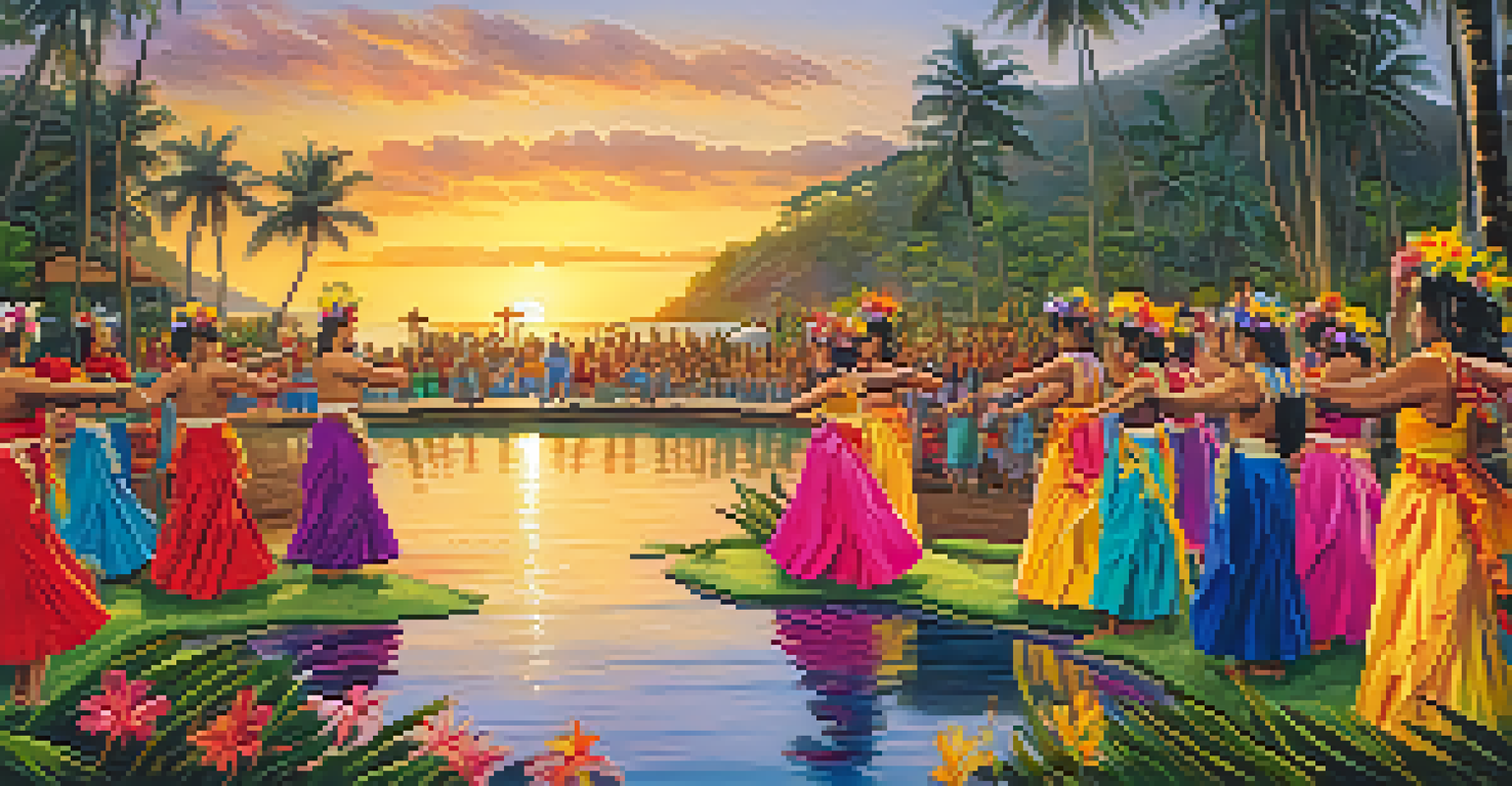The Role of Native Hawaiian Practices in Water Management

Understanding Native Hawaiian Perspectives on Water
Native Hawaiians view water not just as a resource, but as a sacred life source. This perspective stems from a deep-rooted cultural belief that water is a living entity that deserves respect and care. Traditional sayings, like 'Ola i ke kai' (Life is in the sea), illustrate how intertwined water is with Hawaiian identity and existence.
Water is the source of life, and without it, we cannot exist.
This reverence for water influences how Native Hawaiians engage with their environment, encouraging sustainable practices that preserve water quality. For them, stewardship of water is about nurturing a relationship with nature, rather than merely extracting resources for human use. This holistic view promotes a balanced ecosystem where both people and nature thrive.
Understanding this cultural perspective is essential for anyone looking to learn about Hawaiian water management practices. It reveals how deeply interconnected the community is with their natural surroundings. This relationship is foundational to the traditional methods of water management that have been employed for generations.
Traditional Hawaiian Water Systems: An Overview
One of the most notable traditional water systems in Hawaii is the 'ahu, a network of taro terraces that efficiently manages water flow. The 'ahu system not only cultivates taro, a staple food, but also showcases an intricate understanding of hydrology and ecology. This method highlights the importance of gravity-fed irrigation, demonstrating how water can be redirected and managed sustainably.

Another significant practice is the use of 'wai', or water catchment systems that collect rainwater for agricultural use. These systems are designed to maximize water retention and minimize waste, showcasing a deep understanding of local weather patterns and water cycles. By utilizing natural resources wisely, Native Hawaiians have been able to thrive in diverse environments.
Water is Sacred in Hawaiian Culture
Native Hawaiians view water as a sacred life source that requires respect and care, deeply influencing their environmental stewardship.
These traditional practices exemplify a sophisticated understanding of water management that prioritizes sustainability. They also serve as a reminder of the importance of preserving indigenous knowledge in contemporary water conservation efforts. By examining these systems, we can gain valuable insights into eco-friendly water management practices.
The Importance of 'Aloha 'Aina' in Water Stewardship
'Aloha 'aina', meaning love for the land, is a core principle guiding Native Hawaiian water management. This philosophy emphasizes the interconnectedness of land, water, and people, fostering a sense of responsibility toward environmental stewardship. 'Aloha 'aina' encourages individuals to protect and preserve the natural resources that sustain their communities.
If we take care of the land, the land will take care of us.
Through this principle, Native Hawaiians have historically engaged in practices that promote soil and water conservation, such as planting native species and maintaining healthy watersheds. These practices not only support biodiversity but also enhance the quality and availability of water resources. This approach highlights the significance of ethical interactions with the environment.
By embracing 'Aloha 'aina', water management becomes a communal effort rather than an individual pursuit. This collective mindset fosters collaboration and instills a sense of pride in protecting the land and its resources. Such values are essential in today's discussions about sustainable water management.
Cultural Practices Supporting Water Conservation
Cultural practices such as ceremonial rituals and festivals play a vital role in reinforcing the importance of water conservation in Hawaiian society. For example, the Makahiki festival, dedicated to the god Lono, celebrates abundance and encourages sustainable practices, including water management. These cultural events serve as reminders of the sacredness of water and the need for its protection.
Additionally, traditional storytelling and oral histories often recount the significance of water in sustaining life and the consequences of mismanagement. Such narratives help to instill values and share knowledge across generations, ensuring that water conservation remains a priority. This cultural transmission reinforces the community's commitment to protecting their water resources.
Traditional Systems Promote Sustainability
Ancient Hawaiian water management practices, like the 'ahu and 'wai systems, showcase sophisticated, sustainable methods of water conservation.
These cultural practices not only enrich the community's identity but also serve practical purposes in water conservation efforts. They create a shared understanding of the value of water and promote collective action in safeguarding this precious resource. The integration of culture and conservation emphasizes the importance of holistic approaches to water management.
Challenges Facing Native Hawaiian Water Management Today
Despite the rich traditions of Native Hawaiian water management, contemporary challenges threaten these practices. Climate change, urbanization, and land development have altered water availability and quality, impacting traditional systems. For example, increased rainfall variability can disrupt ancient irrigation practices that rely on predictable weather patterns.
Moreover, the introduction of invasive species and pollution can further strain water resources, complicating traditional management efforts. These challenges necessitate adaptive strategies that honor indigenous knowledge while addressing modern environmental concerns. The blending of traditional practices with contemporary science can offer innovative solutions to these pressing issues.
The resilience of Native Hawaiian water management practices is evident, but they require support and recognition to thrive in today's world. Advocacy for the protection of water rights and traditional practices is crucial in ensuring the survival of these systems. By acknowledging and addressing these challenges, we can work towards a more sustainable future for Hawaiian water management.
Modern Applications of Traditional Water Practices
In recent years, there has been a resurgence of interest in integrating traditional Hawaiian water management practices into modern systems. Educators and environmentalists are collaborating with Native Hawaiian practitioners to develop programs that educate communities about sustainable water use. This fusion of old and new methods aims to create a more holistic approach to water management.
For instance, some organizations are implementing culturally-informed water conservation initiatives that draw on traditional practices. These programs often include public workshops and community engagement efforts that highlight the value of indigenous knowledge. By fostering collaboration, these initiatives aim to create a sense of ownership and responsibility among community members.
Cultural Practices Reinforce Conservation
Ceremonial rituals and storytelling in Hawaiian culture play a vital role in emphasizing the importance of water conservation across generations.
The integration of traditional practices into contemporary water management not only preserves cultural heritage but also enhances the effectiveness of conservation efforts. This approach underscores the relevance of indigenous wisdom in addressing modern environmental challenges. As we move forward, recognizing and valuing these practices will be essential in achieving sustainable water management.
The Future of Native Hawaiian Water Management
Looking ahead, the future of Native Hawaiian water management hinges on the recognition and incorporation of traditional practices into modern frameworks. As communities confront ongoing challenges, the revival of indigenous methods can play a crucial role in promoting sustainability. By prioritizing cultural values in policy-making, we can ensure that water management strategies are both effective and respectful of Native Hawaiian traditions.
Moreover, collaborative efforts between Native Hawaiian practitioners and scientists can foster innovative solutions to contemporary issues. By combining traditional ecological knowledge with modern technology, we can create adaptive strategies that address the complexities of water management in a changing climate. This partnership can lead to more resilient and sustainable water systems.

Ultimately, the future of water management in Hawaii will depend on our ability to honor and learn from the past. By celebrating and integrating Native Hawaiian practices, we can build a more sustainable and equitable future for all. This journey requires commitment, respect, and a shared vision for the well-being of our planet.